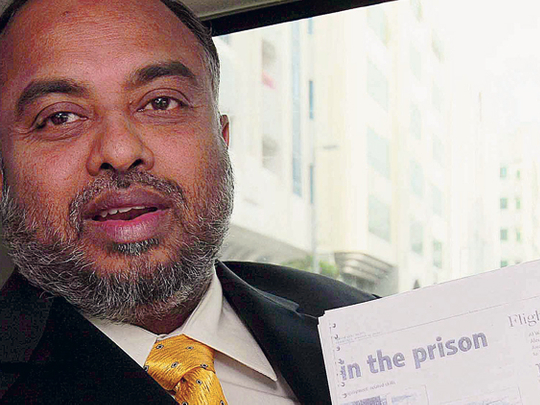
Dubai: All airports and seaports in India will start displaying a list of contraband items and those that are banned in West Asian countries, providing much needed information for travellers to avoid getting arrested in foreign countries.
The Madras High Court has directed the Central Board of Excise and Customs to display a list of banned items for the benefit of travellers, thanks to the efforts of V. Nandakumar, a lawyer based in India.
Nandakumar said it was two reports he read in Gulf News during his visit to the UAE in 2004 and again in 2006 about Indian nationals being arrested and jailed for carrying "kash-kash" that moved him to file a petition with the High Court.
Kash-kash is commonly used for cooking in India but widely prohibited in the Middle East because the poppy seeds can easily be used to produce heroin.
"In August 2004, when I was in the UAE, I read the story of an Indian passenger named Mohammad Abdul Aleem Bahadur who was sentenced to eight years imprisonment for carrying kash-kash. The graphic designer, who was working for the Red Crescent Society in Abu Dhabi, was then serving the jail term at a prison in the capital," said Nandakumar, who is currently on a visit to the UAE.
The graphic designer who was working for the Red Crescent in Abu Dhabi was interviewed by the Tabloid section of Gulf News for a cover story on the artistic works of inmates.
Pilgrims arrested
Again in 2006, he came across another Gulf News report that two Haj pilgrims — Siraj Fareed Mohammad and his aunt Hanifa Yousuf — from Gujarat, India were arrested in Saudi Arabia for the possession of 250 grams of kash-kash.
They were later released after the Indian Consulate intervened on their behalf. "I was aghast that innocent travellers are landing behind bars because they are not aware of the rules. I wrote to the president of India and the prime minister, asking their offices to take immediate action to prevent such mishaps in future," her told Gulf News.
According to him, though he received acknowledgements from the high offices, no action was taken.
A determined Nandakumar then moved a writ petition with the Madras High Court in 2006 arguing that it is the duty of the concerned departments to make passengers aware of the rules in foreign countries.
Nandakumar's untiring efforts yielded results when last December the High Court of Madras issued directives to display the list of banned items in all exit points.
"I am happy that now people traveling to foreign countries will not land in trouble because of their ignorance of the law," said Nandakumar who is working to move the Indian legal system to set up special investigative cells in every state to deal with human trafficking.
"I have noticed that the criminals who cheat women into prostitution with promises of employment in GCC countries and also bogus recruitment firms often go scot-free even after such cases are exposed and the victims rescued. I am proposing the setting up of a special police force in accordance with the Central Bureau of Investigation or at par with Special Crime Branch Unit to track down the culprits and bring them to the law," he said.











